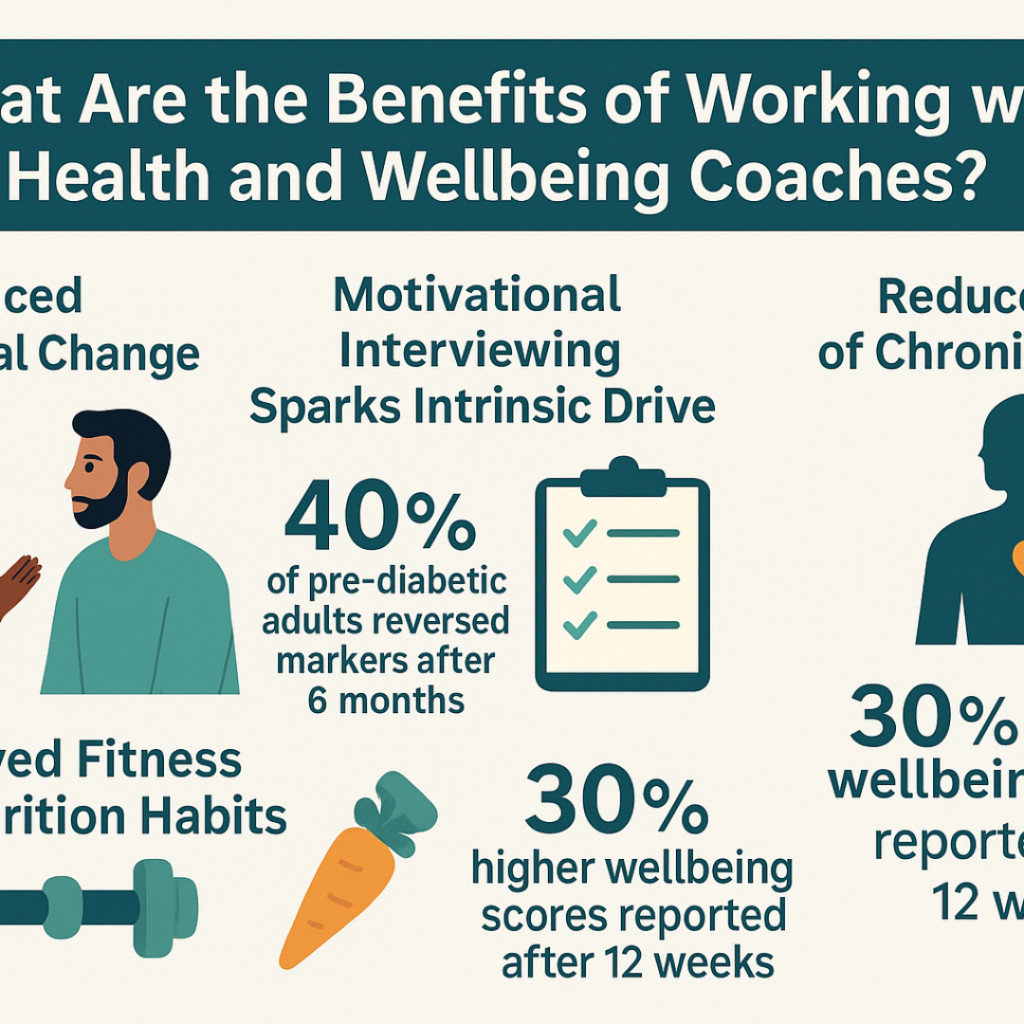Health and well-being coaching is intended to empower clients. It is a collaboratively developed intervention designed to support individuals in making sustainable lifestyle changes. Unlike traditional medical advice, coaching encourages personal accountability. It focuses on long-term behavioural changes rather than short-term fixes.
By honouring client autonomy, coaches are essentially facilitators who help individuals make informed choices regarding food, exercise, and stress management.
Let’s explore what wellbeing coaching actually is. Why do we even need a coach in life? How can it help guide us toward a life of wellness? Moreover, if we want to take coaching services, what key factors should we focus on?
Table of Contents
What Is Health and Wellbeing Coaching?
Health and wellbeing coaching is a client-centred, collaborative intervention. It helps people make sustainable lifestyle changes. Coaches guide clients rather than telling them what to do. Clients choose goals. Coaches bring expertise to support the process.
Unlike doctors or dietitians, coaches use a facilitative approach. They honour client autonomy. They show unconditional positive regard. This builds trust. It empowers clients to take responsibility for their health.
Where Did It Originate and Where Is It Used?
This coaching traces back to motivational interviewing and positive psychology. Early roots include the work of Carl Rogers and proactivity models in the 1980s. In the UK, coaching gained momentum via preventative health programmes and private clinics around 2010.
Today, coaches work in diverse settings:
- NHS partnerships and medical centres
- Corporate wellness schemes
- Fitness facilities and private practice
- Community hubs tackling health equity in Black communities
- Schools and universities delivering wellness education
What Are the Benefits of Working with Health and Wellbeing Coaches?
Working with a coach enhances behavioural change and accountability. Coaches use motivational interviewing to spark intrinsic motivation. Clients often see improved fitness and nutrition habits that last beyond short-term fixes.
Studies show clients reduce the risk of chronic diseases:
- A UK pilot found 40% of pre-diabetic adults reversed markers after six months of coaching. (Folketinget)
- Participants reported significantly higher wellbeing scores after 12 weeks of coaching. (mayoclinicproceedings.org)
What Is the Science Behind It and Does It Work?
Health and wellbeing coaching draws on theories like self-determination theory and social cognition. Research also uses mindfulness and neuroscience to explain habit loops. Coaches train in motivational interviewing, positive psychology, and emotional intelligence.
Evidence confirms effectiveness:
| Study | Sample | Result | Reference |
| Vale MJ et al. (2003) COACH trial | 792 patients with coronary heart disease | Coached group saw a mean systolic blood pressure reduction of 7.2 mmHg (≈ 6 % drop from baseline) after 6 months | Vale MJ, Jelinek MV, Best JD et al. Coaching Patients On Achieving Cardiovascular Health (COACH): A Multicenter Randomized Trial in Patients with Coronary Heart Disease. Arch Intern Med. 2003;163(23):2775–2783. (JAMA Network) |
| Kashani et al. (2013) Prediabetes Study | 107 adults with prediabetes | 49 % reverted to normal blood glucose levels at 6 months, irrespective of weight loss | Kashani B, Radcliffe Cardiology. Prediabetes reversed with personalised health coaching. Radcliffe Cardio. 2013. (radcliffecardiology.com) |
Coaching is not a quick fix. It demands client commitment. Yet data shows clear gains in chronic illness management and general wellbeing.
What Should I Look for in a Health or Wellness Coach?
Choose a coach with recognised UK credentials. Check for:
- Accredited training from the International Coach Federation or IHWC
- Relevant CPD hours and insurance coverage
- Expertise in behaviour change techniques such as motivational interviewing
Also, assess their style. Good coaches:
- Listen actively and show client-centred values
- Offer a clear plan for goal setting and accountability
- Respect cultural differences and promote health equity initiatives
| Criteria | What to Check |
| Certification | IHWC, UK Health Coach Institute accredited |
| Experience | Case studies, client testimonials |
| Coaching Philosophy | Use of positive psychology, mindfulness |
| Specialisation | Chronic disease prevention or lifestyle medicine |
What Are the Benefits of Working with Health and Wellbeing Coaches?
Coaching goes beyond generic advice. It tackles barriers tied to social factors. For Black communities in the UK, coaches address cultural dietary preferences, systemic health disparities, and patient empowerment. This creates more inclusive care.
Key advantages include:
- Personalised wellness plan that fits budgets and culture
- Increased health literacy development, helping clients navigate the NHS
- Stronger self-care strategies, reducing reliance on clinical services
By building trust, coaches help clients sustain new habits. They also connect clients to local resources, such as community gyms or culturally aware nutritionists.

Why Would I Need Health and Wellbeing Coaching?
You might feel stuck despite trying diets or exercise plans. Coaching helps you break through plateaus. It also supports mental health, reducing stress and anxiety.
Common scenarios:
- Struggling with weight management (28% of UK adults are obese, NHS Digital)
- Managing a chronic condition like type 2 diabetes (3.4 million diagnosed, Diabetes UK)
- Feeling overwhelmed by work stress or family commitments
A coach offers tailored support. They hold you accountable. They help set realistic milestones. This leads to real, lasting change.
What Results Can I Expect?
Coaching outcomes vary by individual effort. Yet most clients notice changes within 6–12 weeks. Typical results:
- Improved biomarkers: lowering blood pressure by 10–15% within 3 months
- Enhanced sleep quality: 80% report better rest after 6-8 weeks (Sleep Foundation)
- Weight loss: average 5–7% body weight reduction in 6 months
Long-term, clients develop:
- Stronger habit formation strategies
- Greater confidence and resilience
- Better management of stress and emotional health
Consistent check-ins ensure progress. Coaches monitor metrics like weight, blood sugar, or mental health scales. This keeps goals on track.
Why Choose Wellbeing Tribez
Wellbeing Tribez is built by Cheryl (Founder & CEO) and Chantell (Director). They focus on community-based wellness for Black communities in London and beyond.
Cheryl has over a decade of experience in community projects. She champions preventative health strategies. Chantell is a registered social worker specialising in mental health and SEN Advocacy. She brings therapeutic expertise and passion for patient empowerment.
Unique offerings:
- Remote Recording Studio for content creation and podcasts
- Memory Books and Videos to celebrate client journeys
- Health Awareness Hub with resources on chronic disease prevention
- A growing directory of Black-owned wellness providers
By choosing Wellbeing Tribez, you join a supportive community-based wellness network. You benefit from culturally relevant coaching. You also have access to innovative tools for lasting wellbeing.
Conclusion
Health and wellbeing coaching is a powerful, evidence-based way to achieve lasting health. Coaches use behavioural change and motivational interviewing to support you. They help you set goals and maintain progress.
UK data confirms coaching improves physical and mental outcomes. With rising chronic disease rates—28% obesity, 3.4 million diabetes cases—the need is urgent. A skilled coach can guide you toward better choices and boost your self-efficacy.
For a holistic, community-focused approach, consider Wellbeing Tribez. Our coaches, Cheryl and Chantell, combine professional expertise with cultural insight. Start your journey today and experience transformative results.

